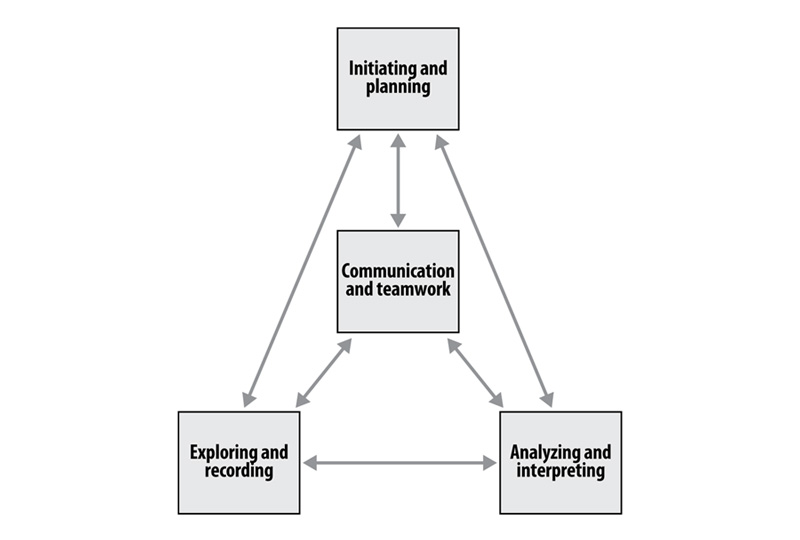The Science Curriculum in Primary and Lower Secondary Grades
In science, learning outcomes are designed to support student acquisition of the knowledge, skills, and attitudes needed for developing scientific literacy. The science curriculum learning outcomes and objectives encompass three overarching areas—knowledge, skills, and attitudes—as described below.6,7
Students will acquire knowledge and understanding of concepts in Life Science; Physical Science; Earth and Space Science; Nature of Science; and Science, Technology, and Society. They will apply their understanding to interpret, integrate, and extend their knowledge. Students will demonstrate an understanding of:
- Living things and their interactions within an ecosystem
- The structure, function, and interactions of systems of the human body
- The structure, properties, changes, and uses of natural or manmade substances
- The forms and transformations of energy and the need for people to use energy wisely
- Cycles and change through the study of local and global environments and the universe
- Scientific inquiry and the application of scientific knowledge to technological developments, and the achievements of Arab scientists
- How science and technology affect and are affected by social and global issues

Students will develop the skills required for scientific and technological inquiry, for solving problems, for communicating scientific ideas and results, for working collaboratively, and for making informed decisions. Four broad areas of skill are outlined in the curriculum framework, as follows:
- Initiating and planning—These encompass the skills of questioning, identifying problems, isolating variables, and selecting variables for investigation.
- Exploring and recording—These encompass the skills of setting up an experiment or investigation, making observations, and collecting and recording data.
- Analyzing and interpreting—These encompass the skills of examining observations and data, presenting them in a way that can be interpreted, drawing conclusions, and evaluating and applying results.
- Communication and teamwork—In science, as in other areas, communication skills are essential at every stage where ideas are being developed, tested, interpreted, debated, and agreed upon. Teamwork skills also are important because the development and application of scientific ideas is a collaborative process in the classroom and in society.
Each group of skills is developed from Grade 1 to Grade 10, with increasing scope and complexity. It is expected that students will:
- Ask questions about objects and events in their immediate environment and develop ideas about how these questions might be answered
- Observe and explore materials and events in their immediate environment and record the results
- Identify patterns and order in objects and events studied
- Work with others and share and communicate ideas about their explorations
- Ask questions about objects and events in the local environment and develop plans to investigate those questions
- Observe and investigate their environment and record the results
- Interpret findings from investigations using appropriate methods
- Work collaboratively to carry out science-related activities and communicate ideas, procedures, and results
- Ask questions about relationships between and among observable variables and plan investigations to address the questions
- Conduct investigations into relationships between and among observations, and gather and record qualitative and quantitative data
- Analyze qualitative and quantitative data and develop and assess possible explanations
- Work collaboratively on problems and use appropriate language and formats to communicate ideas, procedures, and results
Attitudes are generalized aspects of behavior that are modeled for students by example and reinforced by selective approval. Attitudes are not acquired in the same way as skills and knowledge. They cannot be observed at any particular moment, but are evidenced by regular, unprompted manifestations over time. It is expected that students will be encouraged to:
- Recognize and appreciate the contribution of science to their understanding of the world
- Show interest in and curiosity about objects and events within their immediate environment
- Willingly observe, question, and explore
- Consider their observations and their own ideas when drawing conclusions
- Appreciate the importance of accuracy
- Be open-minded in their explorations
- Work with others in exploring and investigating
- Be sensitive to the needs of other people, other living things, and the local environment
- Show concern for their safety and that of others in carrying out activities and using materials
- Appreciate that the applications of science and technology can have advantages and disadvantages
- Appreciate and respect that science has evolved from different views held by women and men from a variety of societies and cultural backgrounds
- Show a continuing curiosity and interest in a broad scope of science-related fields and issues
- Confidently pursue further investigations and readings
- Consider career possibilities in science and technology related fields
- Consider observations and ideas from a variety of sources during investigations and before drawing conclusions
- Value accuracy, precision, and honesty
- Persist in seeking answers to difficult questions and solutions to difficult problems
- Work collaboratively in carrying out investigations as well as in generating and evaluating ideas
- Be sensitive and responsible in maintaining a balance between the needs of humans and a sustainable environment
- Evaluate and determine the consequences of proposed actions, projecting beyond personal experience
- Show concern for safety in planning, carrying out, and reviewing activities
- Become aware of the consequences of their actions
